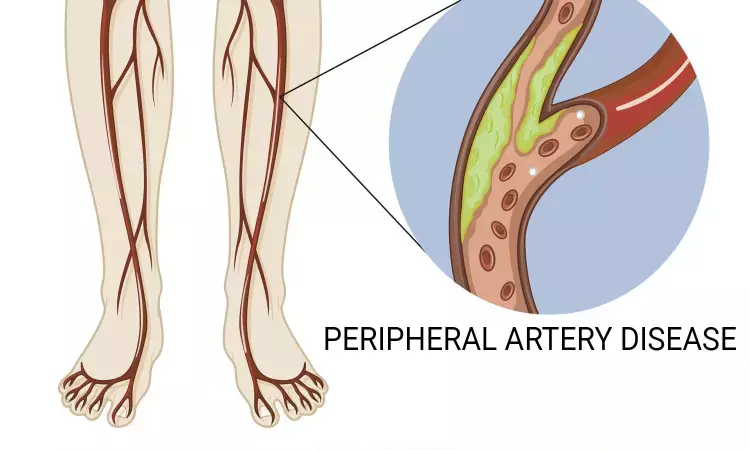- Home
- Medical news & Guidelines
- Anesthesiology
- Cardiology and CTVS
- Critical Care
- Dentistry
- Dermatology
- Diabetes and Endocrinology
- ENT
- Gastroenterology
- Medicine
- Nephrology
- Neurology
- Obstretics-Gynaecology
- Oncology
- Ophthalmology
- Orthopaedics
- Pediatrics-Neonatology
- Psychiatry
- Pulmonology
- Radiology
- Surgery
- Urology
- Laboratory Medicine
- Diet
- Nursing
- Paramedical
- Physiotherapy
- Health news
- Fact Check
- Bone Health Fact Check
- Brain Health Fact Check
- Cancer Related Fact Check
- Child Care Fact Check
- Dental and oral health fact check
- Diabetes and metabolic health fact check
- Diet and Nutrition Fact Check
- Eye and ENT Care Fact Check
- Fitness fact check
- Gut health fact check
- Heart health fact check
- Kidney health fact check
- Medical education fact check
- Men's health fact check
- Respiratory fact check
- Skin and hair care fact check
- Vaccine and Immunization fact check
- Women's health fact check
- AYUSH
- State News
- Andaman and Nicobar Islands
- Andhra Pradesh
- Arunachal Pradesh
- Assam
- Bihar
- Chandigarh
- Chattisgarh
- Dadra and Nagar Haveli
- Daman and Diu
- Delhi
- Goa
- Gujarat
- Haryana
- Himachal Pradesh
- Jammu & Kashmir
- Jharkhand
- Karnataka
- Kerala
- Ladakh
- Lakshadweep
- Madhya Pradesh
- Maharashtra
- Manipur
- Meghalaya
- Mizoram
- Nagaland
- Odisha
- Puducherry
- Punjab
- Rajasthan
- Sikkim
- Tamil Nadu
- Telangana
- Tripura
- Uttar Pradesh
- Uttrakhand
- West Bengal
- Medical Education
- Industry
Rivaroxaban and Aspirin combo reduces vascular risk in Lower Extremity PAD: JAMA

Researchers have recently observed that treatment with rivaroxaban and aspirin in combination compared with aspirin alone led to a large absolute reduction in vascular risk in patients with high-risk limb presentations or high-risk comorbidities, according to the study published in the JAMA Network.
Patients with symptomatic lower extremity peripheral artery disease (LE-PAD) experience an increased risk of major vascular events. There is limited information on what clinical features of symptomatic LE-PAD prognosticate major vascular events and whether patients at high risk have a greater absolute benefit from low-dose rivaroxaban and aspirin.
Hence, Eric Kaplovitch and colleagues from the Population Health Research Institute, McMaster University, Hamilton Health Sciences, Hamilton, Ontario, Canada conducted the study to quantify the risk of major vascular events and investigate the response to treatment with low-doserivaroxaban and aspirin among patients with symptomatic LE-PAD based on clinical presentation and comorbidities.
A total of 4129 patients with symptomatic LE-PAD with a mean age of 66.8 years; out of which 2932 were men were enrolled in the trial. A combination of low-dose rivaroxaban and aspirin compared with aspirin alone was administered. Thirty-month incidence risk of myocardial infarction, stroke and cardiovascular death (MACE), major adverse limb events (MALE) including major vascular amputation, and bleeding were evaluated for.
The following results were noted-
- The 30-month Kaplan-Meier incidence risk of MACE or MALE, including major amputation, was 22.6% in those with prior amputation (this outcome was observed in 54 patients), 17.6% (n = 15) in those with Fontaine III or IV symptoms, and 11.8% (n = 142) in those with previous peripheral artery revascularization, classifying these features as high-risk limb presentations.
- The 30-month incidence risk of MACE or MALE, including major amputation, was 14.1% (n = 118) in those with kidney dysfunction, 13.5% (n = 67) in those with heart failure, 13.4% (n = 199) in those with diabetes, and 12.8% (n = 222) in those with polyvascular disease, classifying these features as high-risk comorbidities.
- Among patients with either high-risk limb presentations or high-risk comorbidities, treatment with rivaroxaban and aspirin compared with aspirin alone was associated with an estimated 4.2% (95% CI, 1.9%-6.2%) absolute risk reduction for MACE or MALE, including major amputation, at 30 months.
- Although the estimated absolute risk increase of major bleeding was higher with rivaroxaban and aspirin in combination than aspirin alone (2.0% [95% CI, 0.5%-3.9%]) for patients with either high-risk limb presentation or high-risk comorbidity, the estimated absolute risk increase of fatal or critical organ bleeding was low in this high-risk group (0.4% [95% CI, 0.2%-1.8%]), such that the net clinical benefit was estimated to be 3.2% (95% CI, 0.6%-5.3%).
Therefore, the authors concluded that "Patients with LE-PAD with high-risk limb presentations or high-risk comorbidities had a high incidence of major vascular events. For these patients, treatment with rivaroxaban and aspirin in combination compared with aspirin alone led to a large absolute reduction in vascular risk."
Dr. Nandita Mohan is a practicing pediatric dentist with more than 5 years of clinical work experience. Along with this, she is equally interested in keeping herself up to date about the latest developments in the field of medicine and dentistry which is the driving force for her to be in association with Medical Dialogues. She also has her name attached with many publications; both national and international. She has pursued her BDS from Rajiv Gandhi University of Health Sciences, Bangalore and later went to enter her dream specialty (MDS) in the Department of Pedodontics and Preventive Dentistry from Pt. B.D. Sharma University of Health Sciences. Through all the years of experience, her core interest in learning something new has never stopped. She can be contacted at editorial@medicaldialogues.in. Contact no. 011-43720751
Dr Kamal Kant Kohli-MBBS, DTCD- a chest specialist with more than 30 years of practice and a flair for writing clinical articles, Dr Kamal Kant Kohli joined Medical Dialogues as a Chief Editor of Medical News. Besides writing articles, as an editor, he proofreads and verifies all the medical content published on Medical Dialogues including those coming from journals, studies,medical conferences,guidelines etc. Email: drkohli@medicaldialogues.in. Contact no. 011-43720751


